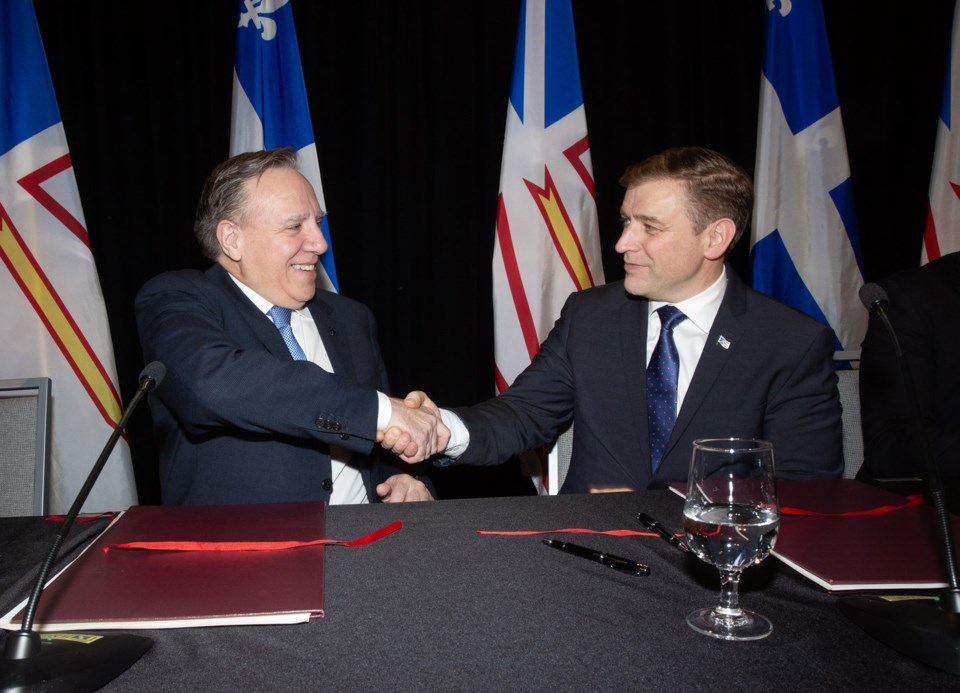ST. JOHN'S, N.L. — Energy observers in Newfoundland and Labrador are urging the provincial government to take a sober second look at a massive tentative deal announced last week with Quebec that promises to deliver hundreds of billions of dollars in revenue to the Atlantic province.
The agreement in principle should be reviewed independently to determine whether it is fair for Newfoundland and Labrador, and whether it offers the best return for the province, Ron Penney said in an interview Tuesday. A former civil servant, Penney led a group of concerned citizens who opposed the disastrous Muskrat Falls hydroelectric project, for which the province is still deeply in debt.
"The process has been really rushed," Penney said, referring to the recently announced deal between the two provinces. "I want to have the public utilities board get into this, right at the at the early stages."
"Let's face it, this is a project for Quebec," he added.
Quebec and Newfoundland and Labrador have been at loggerheads over energy since 1969, when the provinces signed a deal allowing Hydro-Québec to reap the lion's share of profits from power produced at the Churchill Falls hydroelectric plant in Labrador.
Last Thursday, after more than a year of negotiations, Newfoundland and Labrador Premier Andrew Furey literally tore up a copy of that contract during a press conference in St. John's and announced the new deal with Premier François Legault.
If the agreement is ratified by both provinces, Quebec's utility would start paying more for Churchill Falls energy, and pay Newfoundland and Labrador Hydro $3.5 billion for the rights to co-develop two new projects on the Churchill River, officials said.
There are positive aspects to the deal, Penney said. Quebec would manage the new builds — one, an extension to the existing plant and the other, a new plant at Gull Island, further down the river — and absorb any potential cost overruns. As well, if the deal is finalized, Quebec would begin funnelling much-needed cash to Newfoundland and Labrador in short order, beginning with payments of about $475 million for energy in 2025 and part of the $3.5-billion fee.
The provinces hope to reach a binding agreement in April 2026.
But what if Newfoundland and Labrador could have got more from a different partner, Penney asked. He pointed to a Hydro-Québec press release claiming the deal secures 50 years worth of energy at the lowest prices in North America.
"Who got the better of this deal? Is it a fair deal?" he said. "I'm not able to answer this. This is why we need the experts to look at it — the public utilities board — to get expert advice."
The Board of Commissioners of Public Utilities is mandated to ensure rates are reasonable and service is reliable, according to its website. Despite protest from Penney's group, the province did not ask the board to do a full review of the Muskrat Falls project before it went ahead in 2012. It was greenlit that year with a price tag of about $7.4 billion. It finally inched over the finish line last year, after years of delay and at nearly double the cost.
The Newfoundland and Labrador government said Tuesday that the board will be "engaged as appropriate."
Politicians promised Muskrat Falls would usher in a new dawn for Newfoundland and Labrador, just as Furey did last week, said historian Jerry Bannister. The associate professor at Dalhousie University said there was so much fanfare and public support for Muskrat Falls, it was difficult for people to voice concerns.
The same must not happen with Churchill Falls, Bannister said in a recent interview.
In particular, he stressed the need to consult with the Indigenous Peoples whose traditional lands will be impacted by more damming and flooding on the Churchill River. The province has the blessing of the Innu Nation in Labrador, but the Inuit government in northern Labrador expressed concerns last week.
“Just like with the Muskrat Falls project, we worry about the downstream health and environmental effects future hydro developments will have on our way of life," said Johannes Lampe, president of the Nunatsiavut government, in a release Friday evening.
In developing Muskrat Falls, the provincial government at the time did not complete work that would have lessened environmental contamination.
Political scientist Russell Williams said it's unclear why the new agreement spans 50 years, particularly after Newfoundland and Labrador struggled for so long to get out of the past contract, which was set to expire in 2041. He worries the province has a penchant for applauding and approving megaprojects on the promise of revenue and jobs, and that it will cloud decisions about the latest deal on the table.
"I feel like the momentum has already left the station here, and this is a thing that's just going to happen," the associate professor at Memorial University said in an interview. "I am worried that we're not going to get enough public scrutiny here."
The government said it will open the legislature Jan. 6 for a special debate about the memorandum of understanding with Quebec. Williams and Penney worried that timeline wouldn't give opposition parties enough time to find consultants to read the agreement and provide advice.
"We can't afford to take any more risks after Muskrat Falls," Penney said.
This report by The Canadian Press was first published Dec. 17, 2024.
Sarah Smellie, The Canadian Press



